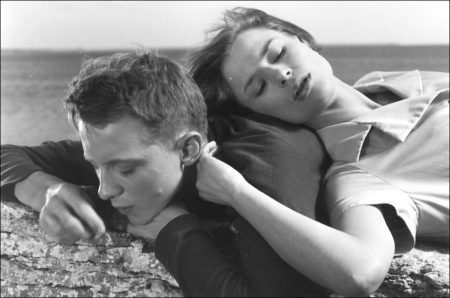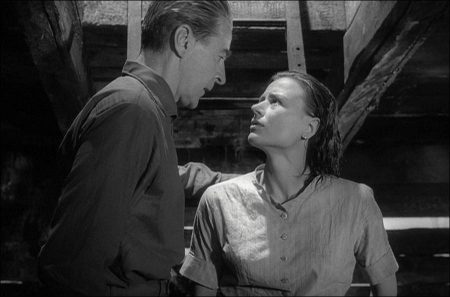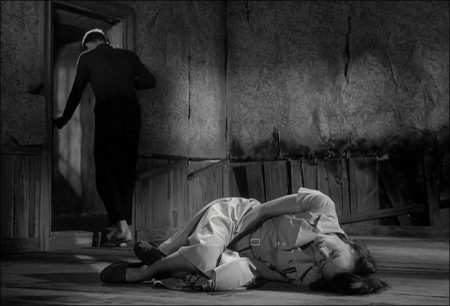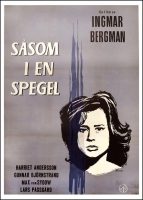Through a Glass Darkly movie storyline. Martin (Max von Sydow), a respected doctor, his wife Karin (Harriet Andersson), Karin’s seventeen year old brother Minus (Lars Passgård), and widowed father David of Karin and Minus’ have convened at the family’s summer home on an island off the coast of Sweden to celebrate David’s return from the Swiss Alps, where he was substantially completing his latest novel. The family has long lived a fantasy of they being a loving one, David’s extended absences which are the cause of many of the family’s problems.
Without that parental guidance, Minus is at a confused and vulnerable stage of his life where he is a bundle of repressed emotions, most specifically concerning not feeling loved by his father and concerning the opposite sex. He is attracted to females as a collective but does not know how to handle blatant female sexuality, especially if it is directed his way.
A month earlier Karin was released from a mental institution. Her doctor has told Martin that the likelihood that she will fully recover from her illness is low, her ultimate fate being that her mental state will disintegrate totally, although she has functioned well since her release. In his love for her, Martin has vowed to himself to see her through whatever she faces. As Karin begins to lose grip on reality, Minus is the one most directly affected, although it does bring out the issues all the men are facing with regard to their interrelationships.
Through a Glass Darkly (Swedish: Såsom i en Spegel), is a 1961 Swedish drama film written and directed by Ingmar Bergman, and starring Harriet Andersson, Gunnar Björnstrand, Max von Sydow and Lars Passgård. The film tells the story of a schizophrenic young woman (Andersson) vacationing with her family on a remote island, during which time she experiences delusions about meeting God, who ultimately appears to her in the form of a monstrous spider. Meanwhile, her author father attempts to use her illness in his work, and her brother struggles with sexual frustration.
Bergman structured the film as a three-act play, drawing on his personal experiences and relationships. The film was his first of several shot on the island of Fårö, at the recommendation of cinematographer Sven Nykvist. The score incorporates the music of Johann Sebastian Bach. Themes explored include the equation of God with love, exploitation in art, psychosis, and sexuality.
Through a Glass Darkly was released to positive reviews, specifically for Andersson’s performance, and won the Academy Award for Best Foreign Language Film. It was followed by Bergman’s thematically related 1963 films Winter Light and The Silence.
About the Filming
Through a Glass Darkly was filmed on the island of Fårö, at cinematographer Sven Nykvist’s recommendation. It was Bergman’s first film shot there, where he would film several more. Nykvist developed his style with the film, employing few camera movements. The director and cinematographer had very serious conversations in which they rethought how lighting should be employed. Nykvist and Bergman also planned to make Through a Glass Darkly as their first colour film collaboration, but were unhappy with the look of the colour shots they tested.
The film relies on natural sounds to convey silence in the characters’ lives, with cello music after the incest scene being an exception. Four interpretations of Sarabande from Suite No. 2 in D minor for Cello, BWV 1008 by Johann Sebastian Bach are used in the film, with cellist Erling Blöndal Bengtsson providing all of them.
About the Themes
The genre of “family drama” is one analytic approach, with academic Frank Gado referring to Minus as the “consciousness” of this portrayal of family. The tense relationship between the family members is revealed in the meal scene, where David’s children are dismayed by his intentions to leave soon after returning to the family, placing a damper on the joy of the occasion.
Minus expresses his desire, “I wish I could talk to Papa just once”. Minus’ play also reveals conflicts. Gado wrote that the story within a story takes place in Saint Teresa’s Chapel, with Saint Teresa having used the “interior castle” as a symbol of the soul. While appearing to be “Gothic nonsense”, Gado argued that Minus was attempting to tell David that he has always fallen short of greatness as a writer, and that Minus’ character uses art to explain his failings in love, in much the same way David retreats to writing to avoid being with Karin. Gado further argued that David’s blindfolding before the performance signifies his eyes opening to reality.
The fact that David plans to use Karin’s condition as a source for his writing creates a “portrait of the artist as charlatan, windbag, and heartless exploiter”, essayist Peter Matthews wrote. In the end, when David shares his thoughts of love as God to Minus, Gado believed Minus is most impressed not by the theory but the “face to face” encounter with his father and the sharing of love, signified in Minus’ closing line “Papa spoke to me”.
In Karin’s relationship with her husband, psychiatrist Barbara Young wrote Karin appears “withdrawn” sexually from Martin, but her sexuality is “still alive in her psychosis”. Young observed what she described as a “flirtatious” relationship she has with Minus, and when she hears voices, she “massages her thighs in a sexual way”. Her sexuality and knowledge of Minus’ sexual frustration is what leads her to incest with Minus, and why they defy the incest taboo, Young wrote. She believed it was this episode of incest that finally led Karin to realize that she “can’t live in two worlds”.
Karin envisions God as a “spider-god”. Bergman’s next film, Winter Light explains the metaphor when the character Tomas, played by Björnstrand, relates the spider-god to suffering, as opposed to his previous ideas of a God of love that provides comfort. The story ends with a discussion of how God is love, a question further explored in Winter Light, which asks if understanding God is as simple as that. One Winter Light character mocks the idea of God as love, quoting the end of Through a Glass Darkly exactly. The title Through a Glass Darkly is derived from 1 Corinthians 13, which Gado observed also follows themes of “faith, hope and love”.
Through a Glass Darkly (1961)
Directed by: Ingmar Bergman
Starring: Harriet Andersson, Gunnar Björnstrand, Max von Sydow, Lars Passgård
Screenplay by: Ingmar Bergman
Production Design by: P.A. Lundgren
Cinematography by: Sven Nykvist
Film Editing by: Ulla Ryghe
Costume Design by: Mago
Makeup Department: Börje Lundh
Music by: Erik Nordgren, Johann Sebastian Bach
MPAA Rating: None.
Distributed by: Janus Films
Release Date: October 16, 1961
Views: 357



